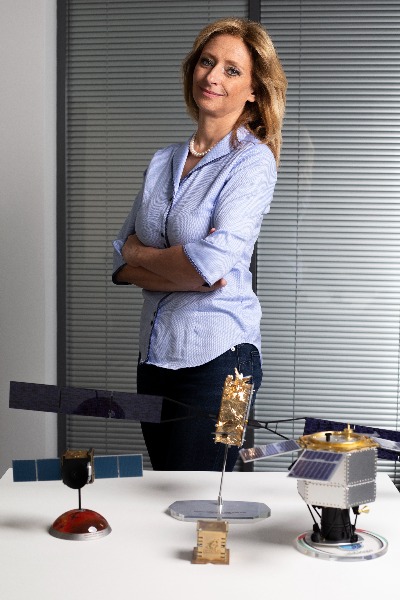
Putting to one side things like the sci-fi dream of colonising Mars, what is the significance of space research?
The space age we are living in today, the space age we are still only seeing the start of, began after World War II. Space technology is now relied upon for global basic services at the level of economic and civil applications, such as navigation, banking and telecommunications systems. It is also of particular importance in digital agriculture, measuring soil moisture or atmospheric composition. The drought of biblical proportions has drawn even more attention to this fact. Understanding the comprehensive background of climate change is based on a satellite database. It is also a cornerstone of security policy, which is perhaps obvious to many living in the shadow of the Russian–Ukrainian conflict: space technology is at the core of earth observation, navigation and remote sensing.
We are clearly talking about a global sector. How does it relate to Hungary?
Hungary has a long history of participating in the scientific side of space research, but its direct past dates back to the 1946 lunar radar experiment. In brief, the team of engineers led by Zoltán Bay and Károly Simonyi measured the Earth-Moon distance using radar signals, the second in the world to do so. Apart from them, only the US was engaged in such activities. In total, four countries have been able to build radars independently: the German Empire, the United Kingdom, the United States and Hungary. However, the World War front destroyed some of the equipment, while the Red Army captured other parts. Therefore, the Hungarian radar had to be rebuilt for the second time, but in the meantime the American team, a few weeks ahead of the Hungarians, successfully completed the experiment. In other words, this was essentially a silver medal equivalent, but what unquestionably is worthy of a gold medal is the Bay correlation reception technique, which is still key in everything from communications to radio astronomy.
And what is our current situation?
Hungary emerged from the Soviet Interkosmos programme — within the framework of which, by the way, Hungary achieved significant results that led humanity to the everyday use of space — after 1990, and since 2015 it has been a fully fledged member of the ESA (European Space Agency) with wide-ranging cooperation opportunities. The Ministry of Foreign Affairs and Trade (MFA) assumed oversight of this area in 2018, with a strong focus on space diplomacy and economic relevance. To this end, cooperation has been extended to all continents, although the main points of alignment are the EU, the ESA and NATO. But we have to recognise that this is a global game and everyone is involved.Does this also mean that space exploration is not a one-man show?
Hungarian developments can be seen in a number of areas, but the size of the country means that Hungarian space activities cannot be assessed in isolation. This is why the role of the MFA is crucial. However, this rule of thumb is not only applicable to medium-sized, smaller countries, but also to the largest: no state can work effectively towards space in a fully national capacity, and it only makes sense in international coordination. The strongest positions are held by the USA, China, Russia and India, and the European Union as a community is also part of this group.
It seems somewhat surprising that India and China are among the forerunners.
This did not happen overnight. Both Asian countries attach great importance to space technology and have taken their ambitions very seriously. Over the past decades, they have worked with great humility and diligence. As a result, China is now building its umpteenth space station over our heads. They have put a female Taikonaut into space and carried out countless programmes. India clearly saw a breakthrough opportunity in space exploration, and rightly so. It is now the fifth largest economy in the world, ahead of the UK. There is a certain charming smile back at history in this. India hopes to reap one of the biggest benefits from the creation of satellite distance learning. Let's not forget, we are talking about a country the size of a continent, just like China. It is possible to deliver the curriculum by satellite to the most inaccessible points, and this can lift an entire region economically. The same holds true for Africa as a whole. China is also closely cooperating with Russian space research, which by this fact alone makes it a powerhouse.There is a war next door, but will there be a war in space?
In a sense, there already is, it's part of everyday life. Space technology has always been a dual-use field. This is why the launch of Sputnik in 1957 was such a shock to the Americans. Because where you can launch a peaceful satellite, you can launch anything else. Space technology is a tool, the one who controls it decides what to do with it.
Does war have a positive impact on space technology?
Armed conflicts undoubtedly have an accelerating effect of sorts on technological developments. At the time, radars were also created for military purposes. At the same time, we are seeing that the policy of sanctions has also made it impossible to transfer the knowledge and technology that is the basis for developing space activities. This is astonishing, as in 1975, at the height of the Cold War, during the Vietnam War, the US and Russia successfully cooperated in the Soyuz-Apollo programme. It was not simply a case of the US Apollo 18 and the Soviet Soyuz 19 spacecrafts linking up in orbit around the Earth. There was an actual exchange of technology. Now the ExoMars mission cannot be launched because the rocket is Russian technology.
Why does it have such dramatic impact that the partnership has broken down?
Because it goes against the interests of science and humanity. Every astronaut who has been up there has come back to Earth with a changed philosophy. It clearly shows what a fragile, out-of-balance planet we have. A space station that holds eight billion of us. We cannot afford not to cooperate right now, when we are running out of time. Climate change, global challenges: we need immediate global responses. Instead, political and technological communication has broken down. This is unsustainable, and if it continues, human civilisation will collapse by 2100. We must acknowledge that 21st century history is being written in space.
Can this problem be overcome?
On paper, one would think humanity has at least this much wisdom. However, the thinkers of China, boasting thousands of years of statehood, or those of Europe, based on the triple pillar of Greek philosophy, Roman law and Judeo-Christian morality, have yet to decipher whether human wisdom is capable of recognising its own limits. Space technology is new, but the dilemma is old. The question is whether there is any emergency situation in which this might come to light.
What could be the next big thing in the near future? Is there a ‘man in space’ project in the pipeline?
It is not a matter of the near future, but it is here, it has arrived, there are already start-ups launched on its basis: space resource exploration, or more simply put, space mining. There are many free resources available in the solar system, and exploiting them could create the economic foundation for the coming era.
Where would the first space mine be established?
The Moon could be humanity's next continent. It is not scientific or literary interest that drives people there, but specifically economic and security policy considerations. The Moon has large reserves of tritium compared to the Earth's surface. The radioactive isotope of hydrogen is necessary for fusion technology, if it ever becomes feasible. The Artemis programme is slowly getting underway, with the aim of putting the first woman and the next man on the Moon by 2024. We are pleased that the radiation measurement equipment was built by a Hungarian participant under the Matryoshka programme. However, it is important to see that lunar activity is a highly sensitive issue. Any activity that might interfere with this is a risk to humanity.
Can human life be transferred to the Moon?
There is no point in pursuing this idea. There will be no transfer, no plan B, no planet B. The human body is a ‘spacesuit’ optimised for terrestrial conditions. Numerous studies have shown that the Earth's gravity field determines the way our bodies work, how our blood circulates, how our muscles grow, how our bones thin, and so on. Mars is a legendary target in this respect, except that it has no magnetic field, which makes it incompatible with our DNA. We cannot even deal with the problems on Earth, how are we going to create a magnetic shield around another planet? Our task, instead, is to keep the Earth fit for human life.